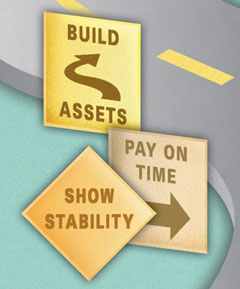Establishing Credit – When Should You Start ?

Length of Credit History Basics
So just what does the credit score take into account when it comes to credit history? Here’s a look:
- Age of the oldest account established, as well as the age of your newest established account. An average age of all accounts is also calculated.
- The amount of time that specific credit cards have been established.
- Amount of time since certain accounts were used.
When to Start Building Credit?
Most credit repair experts agree that people should begin to establish credit as soon as they’re able to handle the financial responsibility and the consequences that they may be subject to. This generally falls into the late high school and early college years.
So how can someone begin to build credit during these late teenage years, especially when they might not have a large income to rely on? Here’s a look at some credit tips for establishing a history:
- Credit card: Parents will need to co-sign on any credit card opened for their child if they’re under 21 years of age and don’t have a consistent, reliable source of income. Many credit card companies offer student credit cards, with low credit ceilings to help teens start establishing credit.
- Authorized user: An alternative to co-signing on a credit card is adding a teen as an authorized credit user on an existing account. This is a preferred route by many experts, as the child can simply be dropped as an authorized user if things go awry – something that’s much easier to do than get out of co-signing.
- Secured credit card: A “secured” credit card is similar to a regular card, except that users are required to put down a deposit as assurance to the creditor that payment can be met. Usually, the amount you’re able to charge with a secured card is limited to the deposit you put down.
Responsibly managing that first credit card that is opened (or amended) with your name on it is the key to building a positive credit history and credit score, which will open more doors down the road in terms of home loans, auto loans and more. However, failing to enact proper debt management during these crucial early years while you’re establishing credit history may not just force you into a lengthy repair credit program, but it can also impact the credit score if you have a co-signer on your account.

